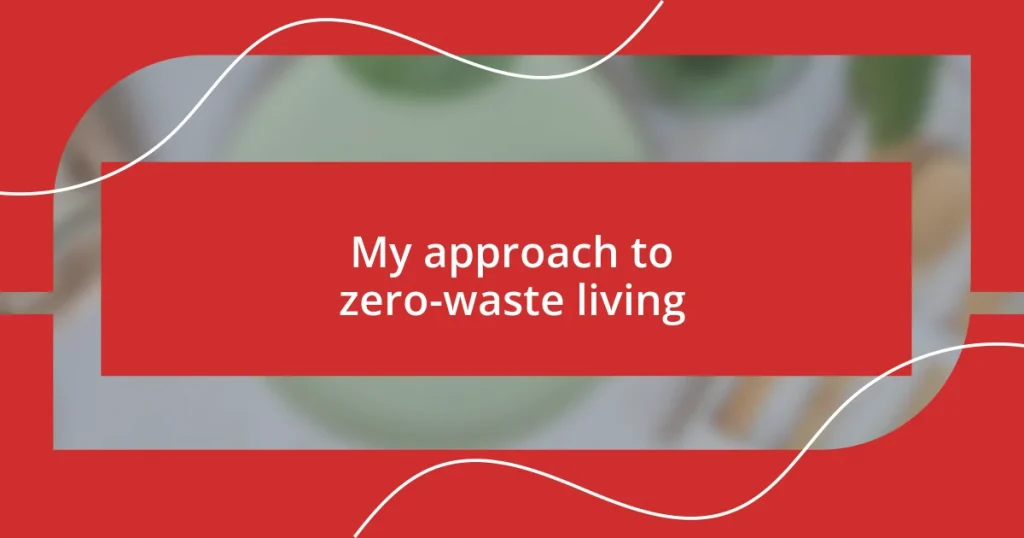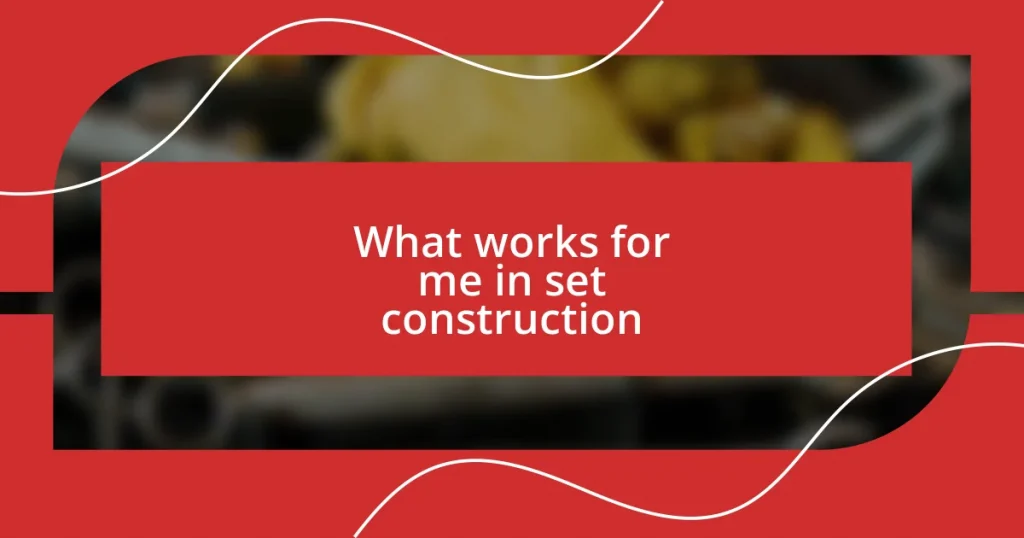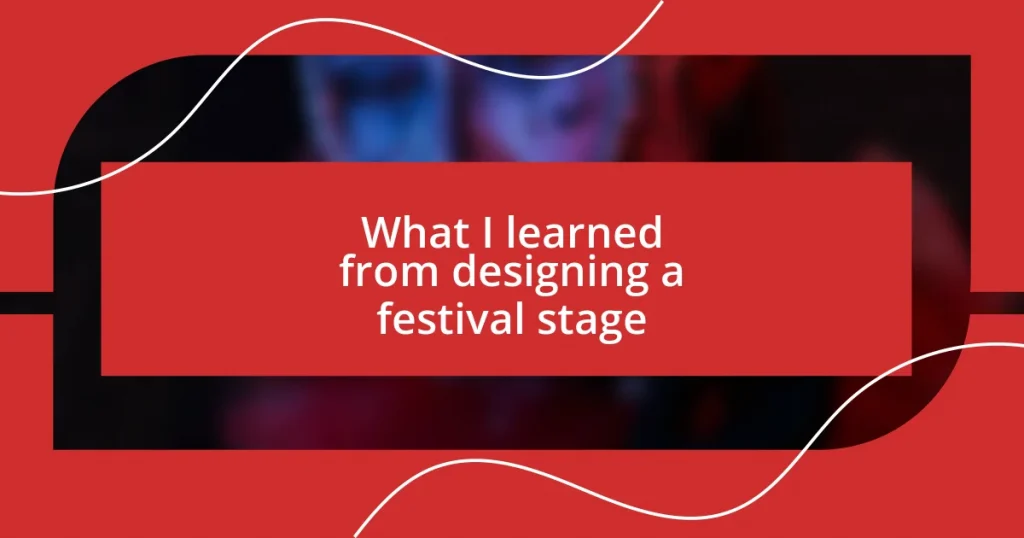Key takeaways:
- Zero-waste living is a mindset shift that emphasizes reducing, reusing, and recycling, leading to personal empowerment and environmental benefits.
- Adopting this lifestyle can result in financial savings, healthier living, and a stronger sense of community through shared values and experiences.
- To sustain a zero-waste lifestyle, continuous learning, community engagement, and regular self-assessment are essential for long-term commitment and progress.
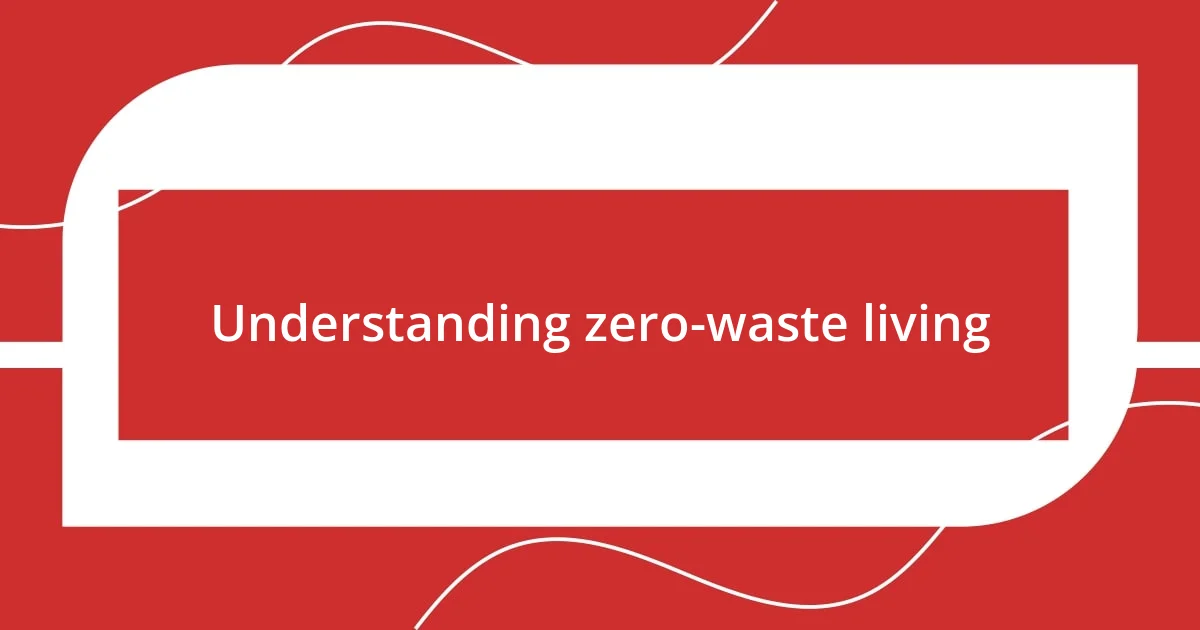
Understanding zero-waste living
Zero-waste living is about much more than just throwing less away; it’s a philosophy that encourages us to rethink our relationship with consumption. When I decided to embrace this lifestyle, I started noticing how many single-use items I had cluttering my life. It really hit me — how often had I reached for a plastic bottle without considering the impact?
As I transitioned, I became more aware of the waste generated in daily activities, leading to a sense of urgency and responsibility. For instance, switching to reusable bags and containers wasn’t just an eco-friendly choice; it felt empowering. Have you ever stopped to think about the ripple effect of your choices? Every small action counts, and I’ve found that even simple steps can lead to significant change in my day-to-day life.
Understanding zero-waste living requires a mindset shift, focusing on reducing, reusing, and recycling. I felt an incredible sense of satisfaction when I saw my trash can significantly lighter after just a few months of consciously choosing items with less packaging. It’s almost like each item I refuse to buy is a small victory for the planet. Isn’t it inspiring to think that our daily choices can contribute to a healthier Earth?
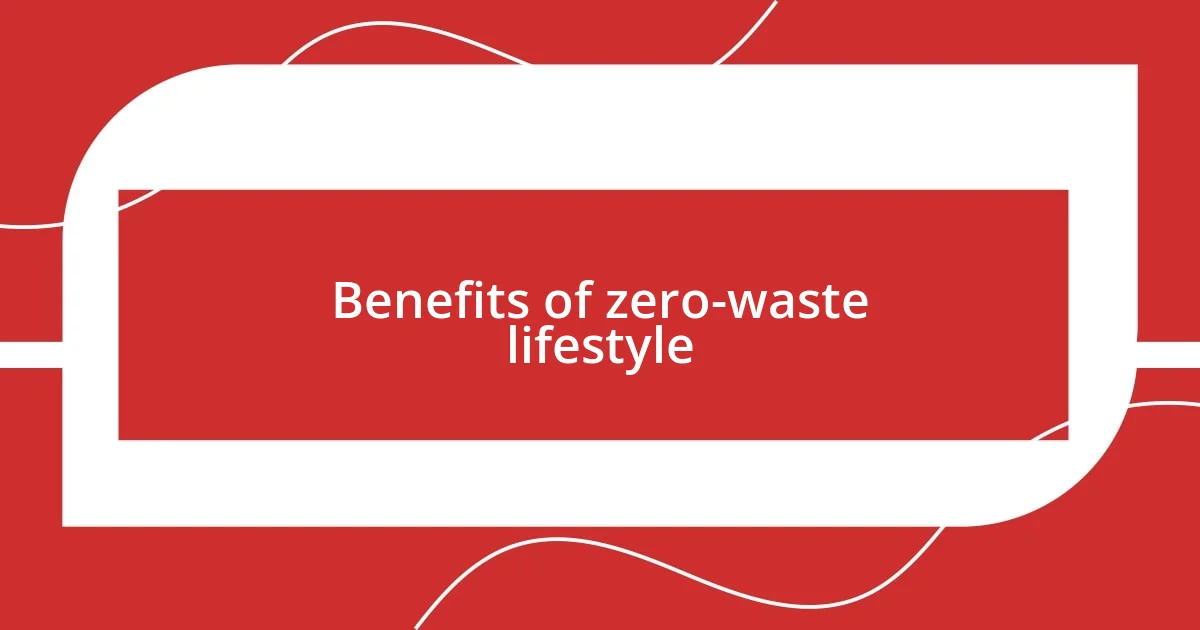
Benefits of zero-waste lifestyle
Adopting a zero-waste lifestyle opens the door to numerous benefits that extend beyond just reducing waste. Personally, one of the most profound changes I’ve experienced is the financial savings that come from buying fewer disposable items. When I transitioned, I started to invest in quality, reusable products instead of the cheaper, single-use alternatives. It might feel like a larger upfront cost at first, but it has definitely paid off over time. My spending habits became more intentional, which not only cleared clutter but also made my budget healthier.
Here are some notable benefits I’ve appreciated since embracing this lifestyle:
- Environmental Impact: Reduces the amount of waste that ends up in landfills.
- Financial Savings: Encourages smarter spending and investment in reusable items.
- Healthier Living: Often leads to less exposure to harmful chemicals found in many disposable products.
- Sense of Community: Fosters connections with like-minded individuals and encourages local initiatives.
- Mindfulness: Promotes a more thoughtful approach to consumption, making me appreciate what I own even more.
Every time I use my reusable produce bags or sip from my stainless steel water bottle, I feel a palpable connection to a larger purpose. It’s a reminder that making these conscious choices contributes to a sustainable future, and that connection can be incredibly uplifting.
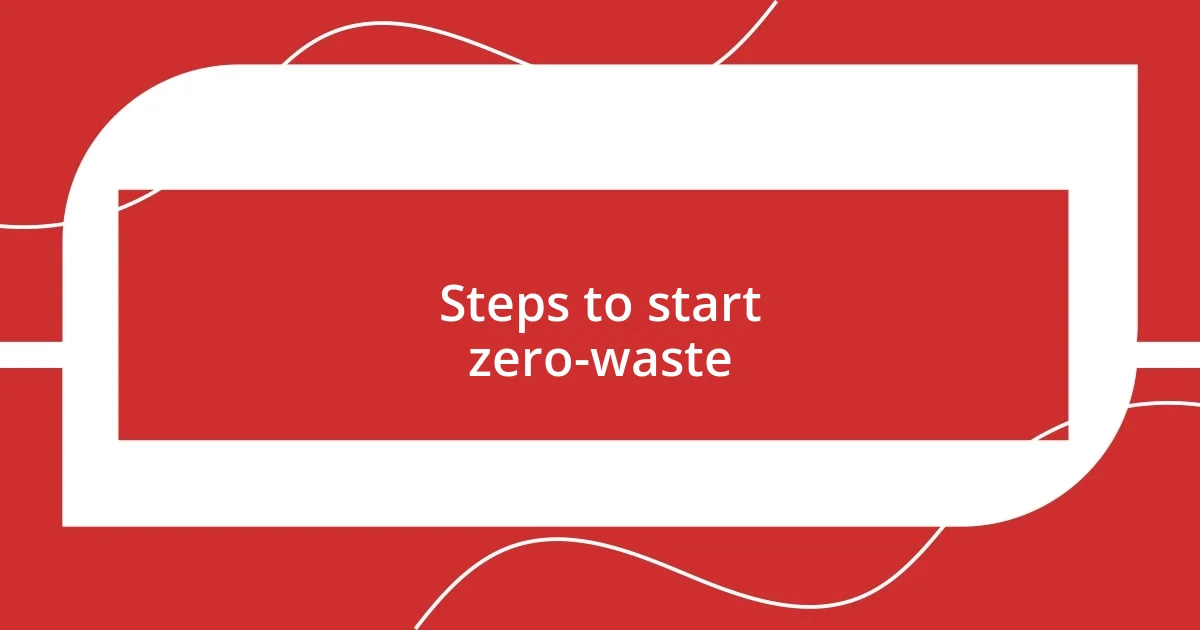
Steps to start zero-waste
To embark on the journey toward zero-waste living, the first step is to conduct an audit of your waste. I remember doing this for the first time—it was an eye-opener, really. Seeing all those single-use items piling up gave me a jolt of reality. I realized that many of the products I had been using were not only unnecessary but were also contributors to waste. This simple practice helps identify what you’re throwing away regularly and can guide you toward more sustainable alternatives.
Next, consider making small, manageable changes in your routine. For example, replacing disposable cups with a reusable one was an easy switch for me. I also started carrying a reusable straw and cutlery. This habit became second nature, and surprisingly, I found it quite liberating. Each alteration not only reduced waste but also felt like reclaiming power over my choices. What adjustments can you imagine making?
As you continue to evolve in your zero-waste lifestyle, it’s essential to connect with your community. I’ve discovered local workshops and swap events that inspired my journey. Engaging with others who share similar goals can provide motivation and new ideas. It’s rewarding to generate a sense of collective responsibility while supporting each other in this endeavor. Have you looked into local zero-waste groups? You might be pleasantly surprised by the resources and support available to you.
| Step | Description |
|---|---|
| Waste Audit | Assess your waste to identify frequently discarded items and consider alternatives. |
| Small Changes | Begin replacing single-use items with reusable alternatives in your daily life. |
| Community Engagement | Join local groups or workshops to learn and share experiences in zero-waste living. |
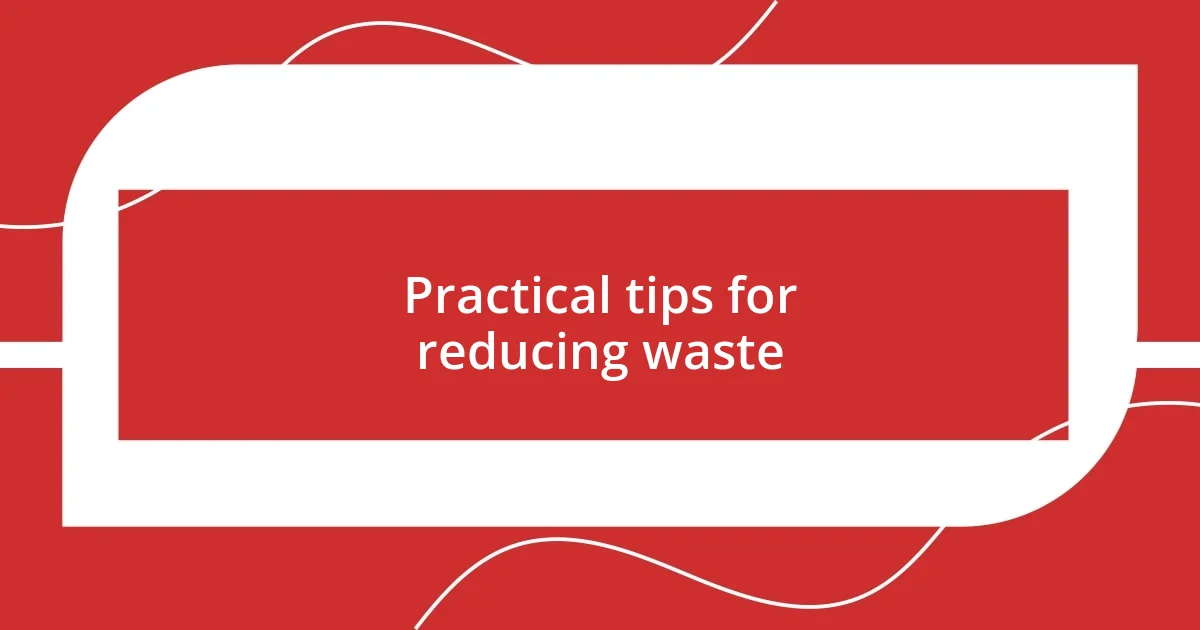
Practical tips for reducing waste
When it comes to reducing waste, one of my favorite practical tips is to carry a reusable shopping bag everywhere I go. I can’t tell you how many times I’ve been at the grocery store, only to realize I didn’t bring a bag. It used to be a hassle, but now that I have a few stashed in my car and another in my purse, I always feel prepared. Have you ever been caught off guard by impulse purchases? With reusable bags on hand, those unplanned buys come with less guilt, and that makes the experience more enjoyable.
Another tip that transformed my routine involves meal prep. I began planning my meals for the week, which drastically reduced food waste in my household. Instead of letting vegetables wilt away in the back of the fridge, I now use up ingredients before they spoil. It’s not just cost-effective, but it also feels rewarding to create nourishing meals while being conscious of what I consume. Have you tried meal prepping? It can really make a difference.
Lastly, I’ve discovered the power of composting. Initially, I felt overwhelmed by the idea, but starting a small compost bin turned out to be easier than I thought. It felt liberating to transform kitchen scraps into nutrient-rich soil. Now, I witness the cycle of food waste becoming something productive, which gives me a real sense of accomplishment. Plus, it’s an excellent conversation starter with friends! Have you considered adding composting to your zero-waste toolkit? It’s not just eco-friendly; it’s a rewarding practice that makes waste reduction tangible.
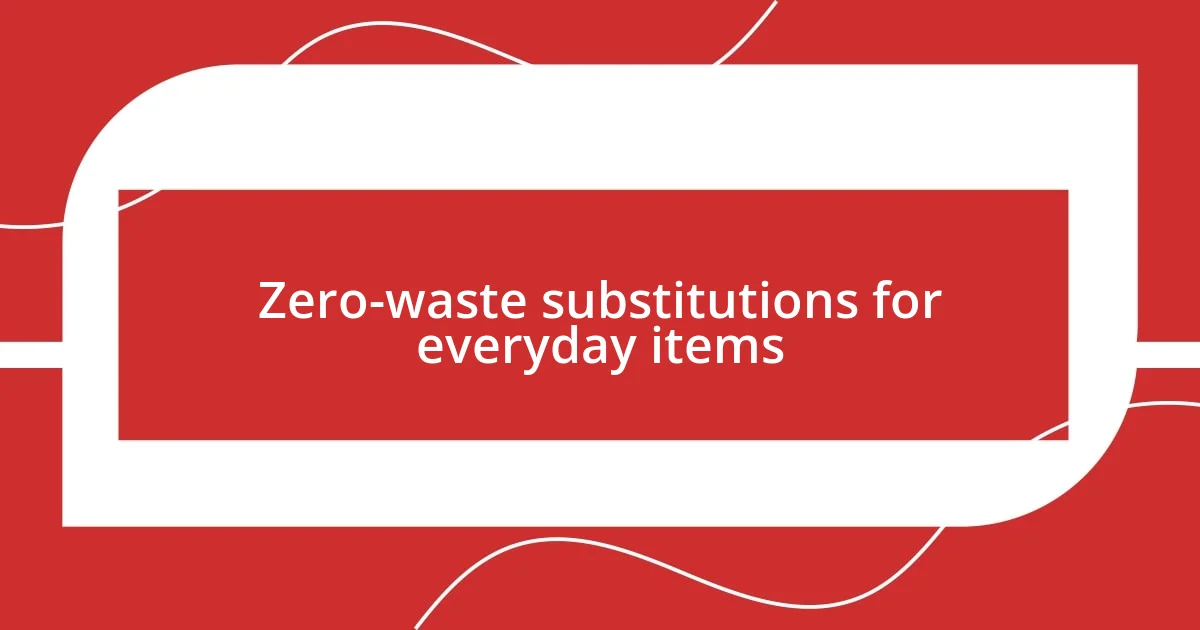
Zero-waste substitutions for everyday items
When I made the switch to reusable cotton rounds for my skincare routine, I couldn’t believe the change it brought. At first, I was skeptical—would they really be as effective? But now, each time I wash them, I appreciate knowing I’m cutting down waste without sacrificing self-care. Plus, they come in fun colors and patterns that make my routine feel a bit more special. Have you ever thought about the small changes that can uplift your daily rituals?
For kitchen staples, glass containers have become my best friend. I used to rely on plastic wrap to cover leftovers, which always felt frustrating—it clung annoyingly and ended in the trash. Transitioning to glass not only feels more elegant but has also dramatically reduced my reliance on single-use plastics. Now, I love seeing my fridge stocked with colorful, organized meals just waiting to be enjoyed. Doesn’t it feel satisfying to create an inviting space while committing to sustainability?
Switching out traditional paper towels for washable cloths was a game-changer for my home. Initially, I was concerned about the messiness of dirty cloths piling up. But I now view it as a sustainable challenge! I keep an easy-to-reach basket for used cloths, making it simple to keep track of them. Each time I wring out a cloth for a new task, I feel like I’m contributing to something bigger. Have you begun to consider rethinking those small items in your home that could create a big impact?
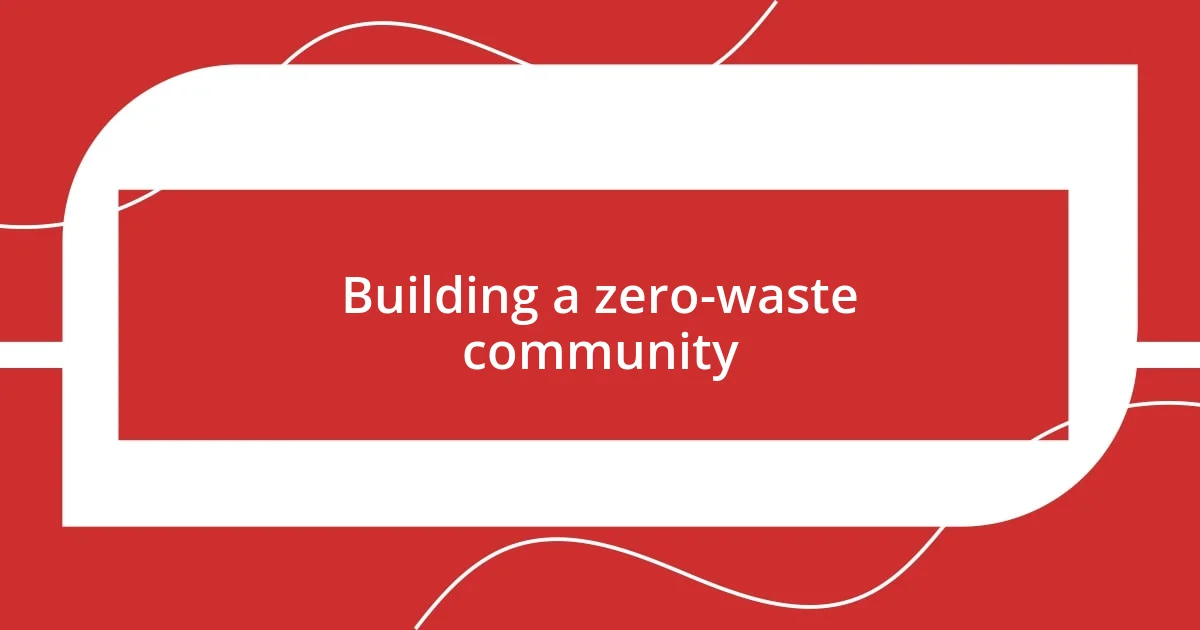
Building a zero-waste community
Building a zero-waste community starts with open dialogue. I’ve noticed that when I share my experiences—like my struggles with plastic waste—it encourages others to open up about their challenges too. It’s intriguing how discussing our journeys creates a sense of camaraderie, as if we’re all walking on a similar path toward sustainability. Have you ever felt that spark of connection when sharing your goals with someone else?
One powerful element of a zero-waste community is collaboration. I remember organizing a local swap event where everyone brought items they no longer needed. The energy was incredible! People left with treasures and a lighter load, and it really emphasized the idea that waste can be someone else’s bounty. Doesn’t it feel empowering to transform items that would have been discarded into tools for community building?
Finally, I truly believe that education plays a crucial role in nurturing a zero-waste mindset. I’ve attended workshops that covered everything from composting basics to DIY cleaning products—knowledge that I now share with friends and family. It’s remarkable how a simple gathering can inspire action. Have you considered hosting a small group discussion or workshop? Sharing knowledge could be the key to creating a ripple effect in your community, sparking curiosity and motivating others to rethink their waste habits.
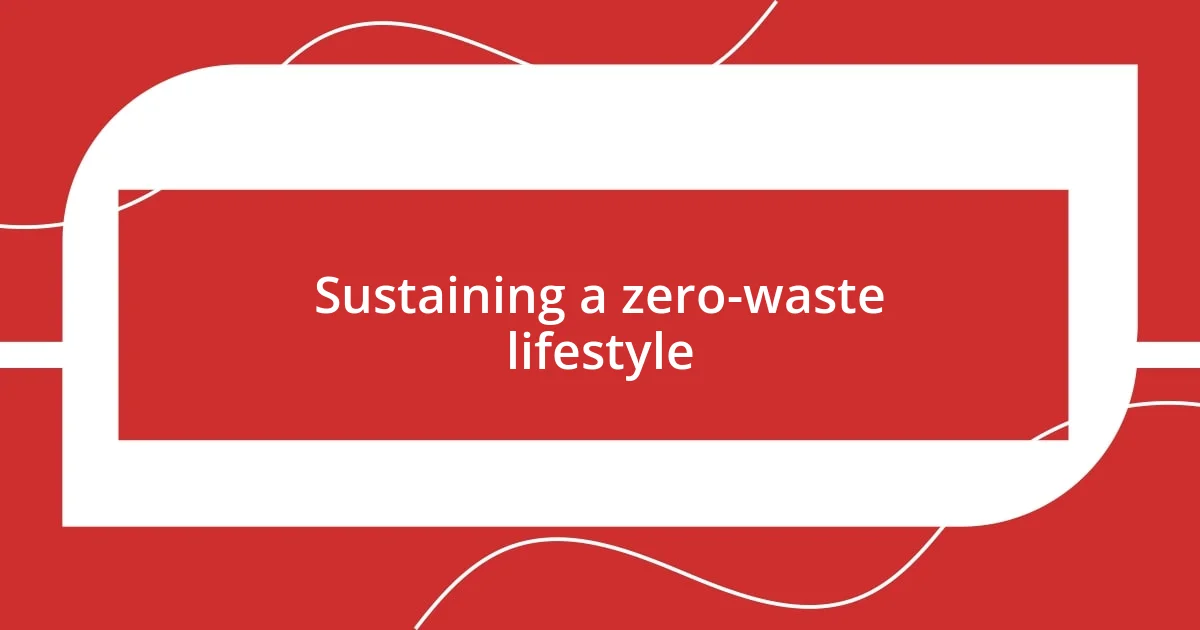
Sustaining a zero-waste lifestyle
Sustaining a zero-waste lifestyle requires a commitment to continuous learning and adaptation. I remember the moment I realized that my eco-friendly journey wouldn’t be a one-time event but a lifelong process. I often find joy in researching new sustainable products and practices, whether it’s watching a documentary or reading blogs. Have you ever felt that excitement when discovering a new tip that helps reduce your waste?
Moreover, I’ve found that creating rituals around sustainability reinforces my commitment. For instance, I now have a monthly “zero-waste audit” day where I go through my waste habits and assess how I can improve. This practice not only helps me stay accountable but also allows me to celebrate the progress I’ve made. It’s invigorating to see how far I’ve come. Have you thought about incorporating similar practices into your routine to track your journey?
Lastly, surrounding myself with like-minded individuals has been vital. Joining online forums and local groups has connected me to a wealth of experiences and inspiration. Just last month, I attended a community event where we discussed various ways to reduce waste, and I left feeling invigorated and armed with new strategies. Engaging with others who share this passion can spark creativity and make the path less daunting. Have you experienced the power of community in your own sustainability efforts?










